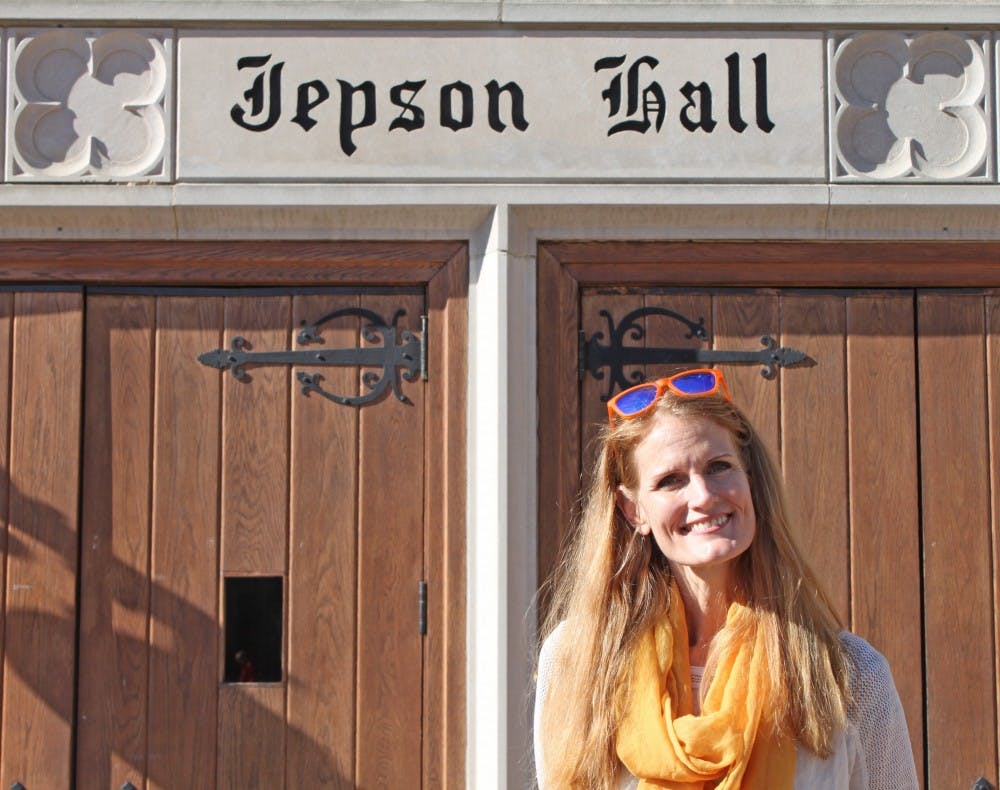When Crystal Hoyt came to the University of Richmond in 2003, she didn’t think she would stay very long.
Sixteen years later, she is the associate dean of academic affairs in the Jepson School of Leadership Studies. She's still a professor in leadership studies and psychology and she serves as interim director of the teaching and scholarship initiative. And, in December, she was awarded fellowship status by the American Psychological Association for her contributions to the field.
Needless to say, she stays busy.
Hoyt was first notified of her fellowship status award by the APA in December. The award, according to the APA website, is given to “members who have shown evidence of unusual and outstanding contributions or performance in the field of psychology,” and requires that a candidate’s work “has had a national impact on the field of psychology beyond a local, state or regional level.”
“It was totally out of the blue,” Hoyt said. “I had no idea, and that made it very special.”
Hoyt’s research focused on belief systems -- the core values that drive us to make certain choices. One focus of Hoyt's research has been how belief systems feed attitudes about criminal justice. She looked at people’s beliefs about the prison system, what that system should accomplish and how people's beliefs differ based on political ideology.
“There’s actually really interesting questions when I talk about belief systems,” Hoyt said. “So, one is political ideology. And I don’t mean that in a very simple way, like of course we know liberals and conservatives differ in their views of justice. I’m looking at that as a motivator for what we believe about the nature of people. Can people change or are people just born one way and that's who they are?”
If you believe people can change, Hoyt said, then you are likely to support a criminal justice system that supports ideas and policies of redemption. On the other hand, if you believe people are born the way they are, then you are likely to view the criminal justice system as punishment and support policies that treat the prison system as such.
Some of her other research focused on belief systems around prejudice, and how difficult it is to change prejudiced thoughts. A lot of social psychology research has shown a link between blame and prejudices, Hoyt said.
For example, in the case of the LGBTQ community, she said, a push to gain acceptance for a long time was based on a “born this way” narrative. That is, the blame some people place on members of the LGBTQ community can be shifted away when advocates for the LGBTQ community emphasize that sexual minorities were born the way they are and did not choose their sexual orientation.
What is interesting, Hoyt said, is that very little research actually showed that shifting blame away from LGBTQ people decreased prejudices. In her research, Hoyt discovered that although shifting blame did decrease prejudice, there was another force that caused a zero-net change in prejudices. Hoyt found that this other effect is that when people with prejudices accept that LGBTQ people were born this way and cannot change, their reasoning behind their prejudice shifts.
“The message powerfully decreases blame, which decreases prejudice, but at the exact same time in the equation, it super increases this notion of what we call essentialism -- always having this devalued identity, and you can never get rid of it and that’s just who you are,” Hoyt said. “You will always have this devalued identity.”
Enjoy what you're reading?
Signup for our newsletter
Hoyt has seen this phenomenon in other forms of prejudice such as weight, and has learned that prejudices are very hard to eliminate, she said.
“You can move the basis to which people rely on to justify their prejudice and discrimination,” she said. “But it's harder to move the actual prejudice and discrimination around.”
Still, Hoyt said, these findings will never deter her from trying to find a way to eliminate prejudices.
In between her own research, Hoyt is overseeing two students doing research with her this semester. One of these students is Jamie Katz, a senior doing her honors thesis on awe, and how the emotion can help people deal with loss.
Katz said she met with Hoyt once a week to discuss the previous week’s progress and assignments for the current week. Hoyt oversees her project, Katz said, and gives guidance and suggestions, while letting her come up with ideas for her own research.
“We have a pretty great relationship outside of just working on this stuff,” Katz said.
That type of relationship between students and professors is what Hoyt said had kept her at UR all these years.
“I love it here," Hoyt said. "I love working with students. That’s why I’m here.”
Contact contributor Andy Erickson at andrew.erickson@richmond.edu.
Support independent student media
You can make a tax-deductible donation by clicking the button below, which takes you to our secure PayPal account. The page is set up to receive contributions in whatever amount you designate. We look forward to using the money we raise to further our mission of providing honest and accurate information to students, faculty, staff, alumni and others in the general public.
Donate Now



